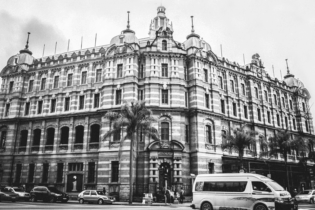Debates about alternative ways of covering the costs of e-tolling incurred by the Gauteng Freeway Improvement Project (GFIP) are continuing.
On Monday evening at a South African Institution of Civil Engineering (Saice) panel discussion on all things e-tolling, it became evident just how divided opinion is. The Opposition for Urban Tolling Alliance (Outa) chairperson, Wayne Duvenage said: “It was a nicely balanced discussion. I thought it would be like walking into the lion’s den with all these engineers whose projects have all been put on hold (because of our court interdict), but strangely enough, half of the engineers were also against e-tolling. “It was a good debate and was nice to expose our views to that audience.” Economist and transportation and traffic engineer, Dr John Sampson said the main question was whether tolling, which is a tax, was an efficient one. “It is not, it is incredibly inefficient and expensive. It is not justifiable to have tolls when there are far better and cheaper ways. Simply add or even take 5c from the fuel levy and dedicate it to funding the GFIP,” said Sampson. The problem, Sampson argued, was that roads agencies had not been given an alternative to tolling if they wanted to build or upgrade roads. “The figure that 50% of the cost of the e-toll will go towards paying for collection is unjustifiable,” said Sampson. Dr Malcolm Mitchell, the retired Deputy Director General in the Department of Transport, and executive director at the South African Roads Federation explained the funding of South Africa’s roads needed to be reviewed with what was taking place overseas. Mitchell said: “Traditionally, roads have been funded by the treasury and through the fuel levy. In certain countries , the heavier trafficked routes are funded through tolling.“However, in the future, the fuel levy’s contribution to treasury is going to decrease by about 20% by 2025 because of technological changes to the combustion engine. We can’t rely entirely on the fuel levy entirely, that is why people are looking for greater depth and alternative funding.”
Open-road tolling in an urban/metropolitan area is becoming the norm internationally as boomed tolling is simply unfeasible. Mitchell said the famous N25 ring road in London was becoming an e-toll route. “To deal with congestion government needs to relook at a proposal from about 25 years ago, which would have built the equivalent of the London underground in Johannesburg,” said Mitchell. The GFIP would save Gauteng some R20bn in time savings and accidents estimated the Centre for Scientific and Industrial Research. Gerard de Villiers, a logistics and transport planning specialist, said: “We have to look at the traffic system as a whole and understand that the improved freeways, the Gautrain and other forms of public transport should be managed as an integrated solution to provide and ensure mobility. “The benefits of tolling include the following: users pay for what they use, funding of capital investment, travel demand management (such as smoothing peak hour demand with differentiated tariffs), support of public transport and change of behaviour. The benefits of time saving, reduced congestion and lower operational costs clearly outweigh the costs of the toll.” Source: Michael Appel –michaela@thenewage.co.za






